Seminal Theories of Governance and Stewardship in Organizations
VerifiedAdded on 2023/01/18
|9
|3059
|32
Essay
AI Summary
This essay delves into the seminal theories of governance and stewardship, exploring their critical roles in organizational effectiveness. It begins by defining governance and its core elements, emphasizing accountability, ethical actions, and risk management. The essay then examines key governance theories, including agency theory, stakeholder theory, and resource dependency theory, illustrating how each contributes to achieving organizational goals and stakeholder satisfaction. It further analyzes the role and contribution of stewardship theory in both non-profit and for-profit organizations, highlighting its impact on decision-making, accountability, and brand image. The discussion extends to the relationship between a leader's values and beliefs and effective governance, underscoring the significance of strong leadership in establishing corporate governance, motivating employees, and fostering stakeholder engagement. The essay concludes by emphasizing the importance of effective governance for organizational survival and success in a competitive environment.
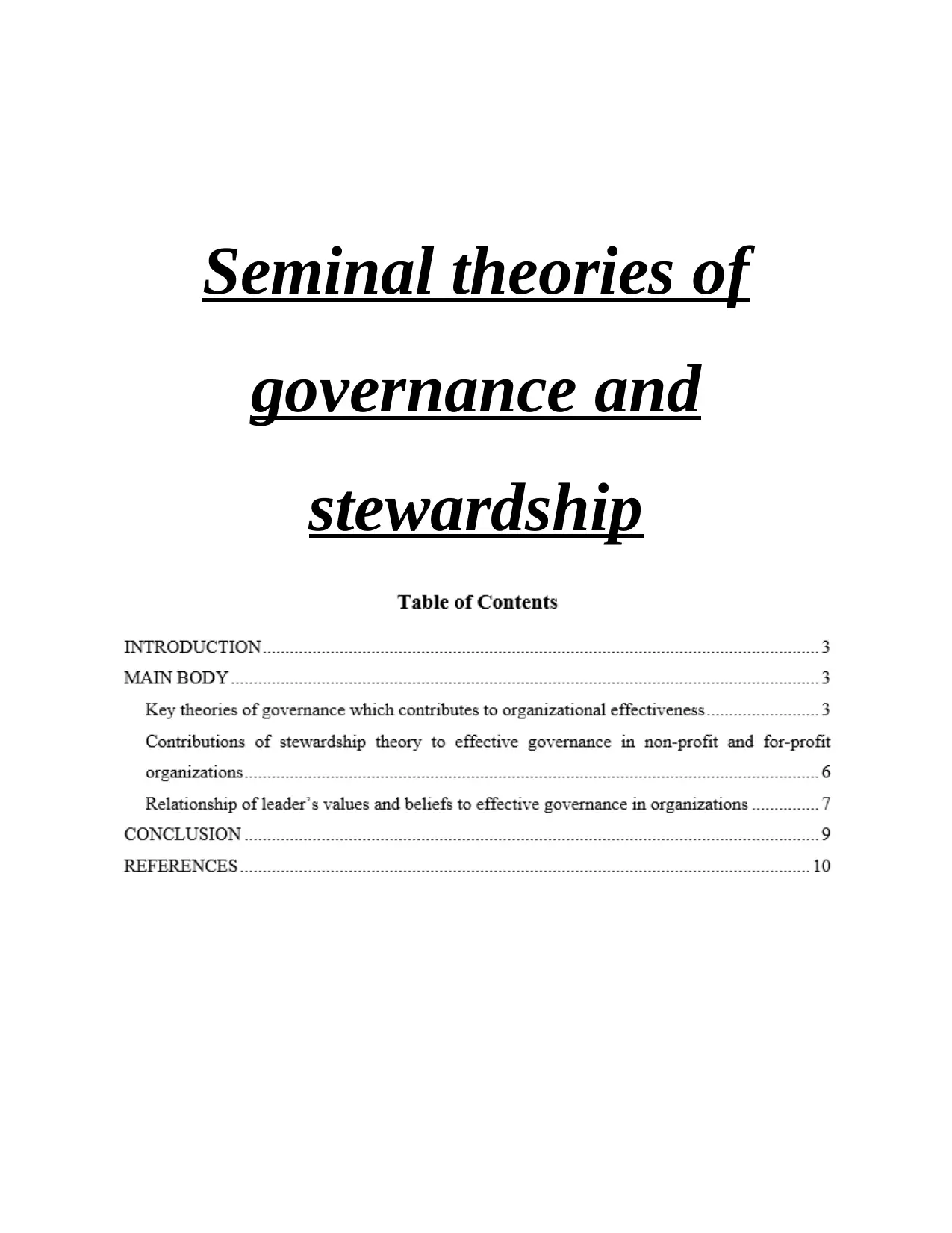
Seminal theories of
governance and
stewardship
governance and
stewardship
Paraphrase This Document
Need a fresh take? Get an instant paraphrase of this document with our AI Paraphraser
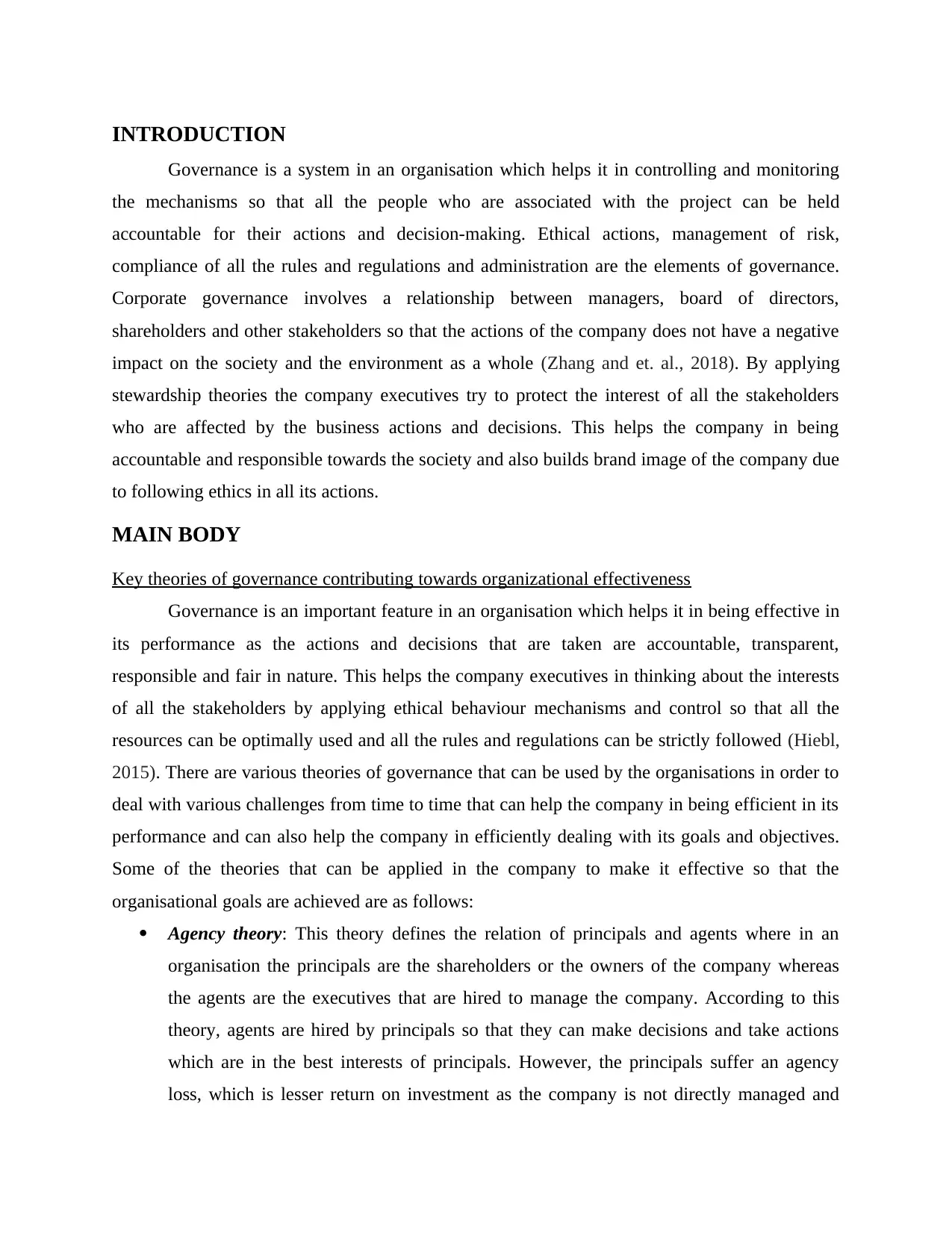
INTRODUCTION
Governance is a system in an organisation which helps it in controlling and monitoring
the mechanisms so that all the people who are associated with the project can be held
accountable for their actions and decision-making. Ethical actions, management of risk,
compliance of all the rules and regulations and administration are the elements of governance.
Corporate governance involves a relationship between managers, board of directors,
shareholders and other stakeholders so that the actions of the company does not have a negative
impact on the society and the environment as a whole (Zhang and et. al., 2018). By applying
stewardship theories the company executives try to protect the interest of all the stakeholders
who are affected by the business actions and decisions. This helps the company in being
accountable and responsible towards the society and also builds brand image of the company due
to following ethics in all its actions.
MAIN BODY
Key theories of governance contributing towards organizational effectiveness
Governance is an important feature in an organisation which helps it in being effective in
its performance as the actions and decisions that are taken are accountable, transparent,
responsible and fair in nature. This helps the company executives in thinking about the interests
of all the stakeholders by applying ethical behaviour mechanisms and control so that all the
resources can be optimally used and all the rules and regulations can be strictly followed (Hiebl,
2015). There are various theories of governance that can be used by the organisations in order to
deal with various challenges from time to time that can help the company in being efficient in its
performance and can also help the company in efficiently dealing with its goals and objectives.
Some of the theories that can be applied in the company to make it effective so that the
organisational goals are achieved are as follows:
Agency theory: This theory defines the relation of principals and agents where in an
organisation the principals are the shareholders or the owners of the company whereas
the agents are the executives that are hired to manage the company. According to this
theory, agents are hired by principals so that they can make decisions and take actions
which are in the best interests of principals. However, the principals suffer an agency
loss, which is lesser return on investment as the company is not directly managed and
Governance is a system in an organisation which helps it in controlling and monitoring
the mechanisms so that all the people who are associated with the project can be held
accountable for their actions and decision-making. Ethical actions, management of risk,
compliance of all the rules and regulations and administration are the elements of governance.
Corporate governance involves a relationship between managers, board of directors,
shareholders and other stakeholders so that the actions of the company does not have a negative
impact on the society and the environment as a whole (Zhang and et. al., 2018). By applying
stewardship theories the company executives try to protect the interest of all the stakeholders
who are affected by the business actions and decisions. This helps the company in being
accountable and responsible towards the society and also builds brand image of the company due
to following ethics in all its actions.
MAIN BODY
Key theories of governance contributing towards organizational effectiveness
Governance is an important feature in an organisation which helps it in being effective in
its performance as the actions and decisions that are taken are accountable, transparent,
responsible and fair in nature. This helps the company executives in thinking about the interests
of all the stakeholders by applying ethical behaviour mechanisms and control so that all the
resources can be optimally used and all the rules and regulations can be strictly followed (Hiebl,
2015). There are various theories of governance that can be used by the organisations in order to
deal with various challenges from time to time that can help the company in being efficient in its
performance and can also help the company in efficiently dealing with its goals and objectives.
Some of the theories that can be applied in the company to make it effective so that the
organisational goals are achieved are as follows:
Agency theory: This theory defines the relation of principals and agents where in an
organisation the principals are the shareholders or the owners of the company whereas
the agents are the executives that are hired to manage the company. According to this
theory, agents are hired by principals so that they can make decisions and take actions
which are in the best interests of principals. However, the principals suffer an agency
loss, which is lesser return on investment as the company is not directly managed and
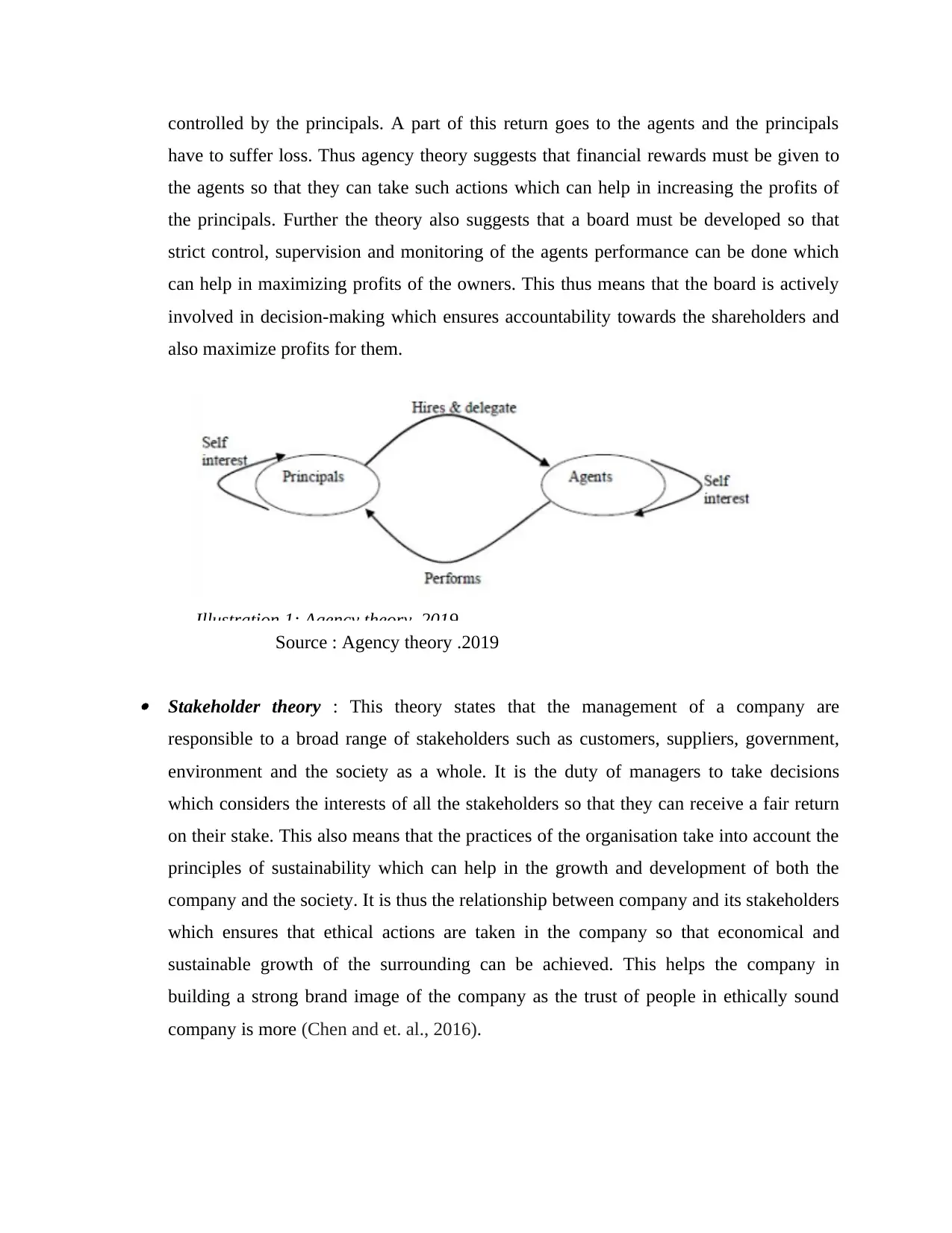
controlled by the principals. A part of this return goes to the agents and the principals
have to suffer loss. Thus agency theory suggests that financial rewards must be given to
the agents so that they can take such actions which can help in increasing the profits of
the principals. Further the theory also suggests that a board must be developed so that
strict control, supervision and monitoring of the agents performance can be done which
can help in maximizing profits of the owners. This thus means that the board is actively
involved in decision-making which ensures accountability towards the shareholders and
also maximize profits for them.
Source : Agency theory .2019
Stakeholder theory : This theory states that the management of a company are
responsible to a broad range of stakeholders such as customers, suppliers, government,
environment and the society as a whole. It is the duty of managers to take decisions
which considers the interests of all the stakeholders so that they can receive a fair return
on their stake. This also means that the practices of the organisation take into account the
principles of sustainability which can help in the growth and development of both the
company and the society. It is thus the relationship between company and its stakeholders
which ensures that ethical actions are taken in the company so that economical and
sustainable growth of the surrounding can be achieved. This helps the company in
building a strong brand image of the company as the trust of people in ethically sound
company is more (Chen and et. al., 2016).
Illustration 1: Agency theory .2019
have to suffer loss. Thus agency theory suggests that financial rewards must be given to
the agents so that they can take such actions which can help in increasing the profits of
the principals. Further the theory also suggests that a board must be developed so that
strict control, supervision and monitoring of the agents performance can be done which
can help in maximizing profits of the owners. This thus means that the board is actively
involved in decision-making which ensures accountability towards the shareholders and
also maximize profits for them.
Source : Agency theory .2019
Stakeholder theory : This theory states that the management of a company are
responsible to a broad range of stakeholders such as customers, suppliers, government,
environment and the society as a whole. It is the duty of managers to take decisions
which considers the interests of all the stakeholders so that they can receive a fair return
on their stake. This also means that the practices of the organisation take into account the
principles of sustainability which can help in the growth and development of both the
company and the society. It is thus the relationship between company and its stakeholders
which ensures that ethical actions are taken in the company so that economical and
sustainable growth of the surrounding can be achieved. This helps the company in
building a strong brand image of the company as the trust of people in ethically sound
company is more (Chen and et. al., 2016).
Illustration 1: Agency theory .2019
⊘ This is a preview!⊘
Do you want full access?
Subscribe today to unlock all pages.

Trusted by 1+ million students worldwide
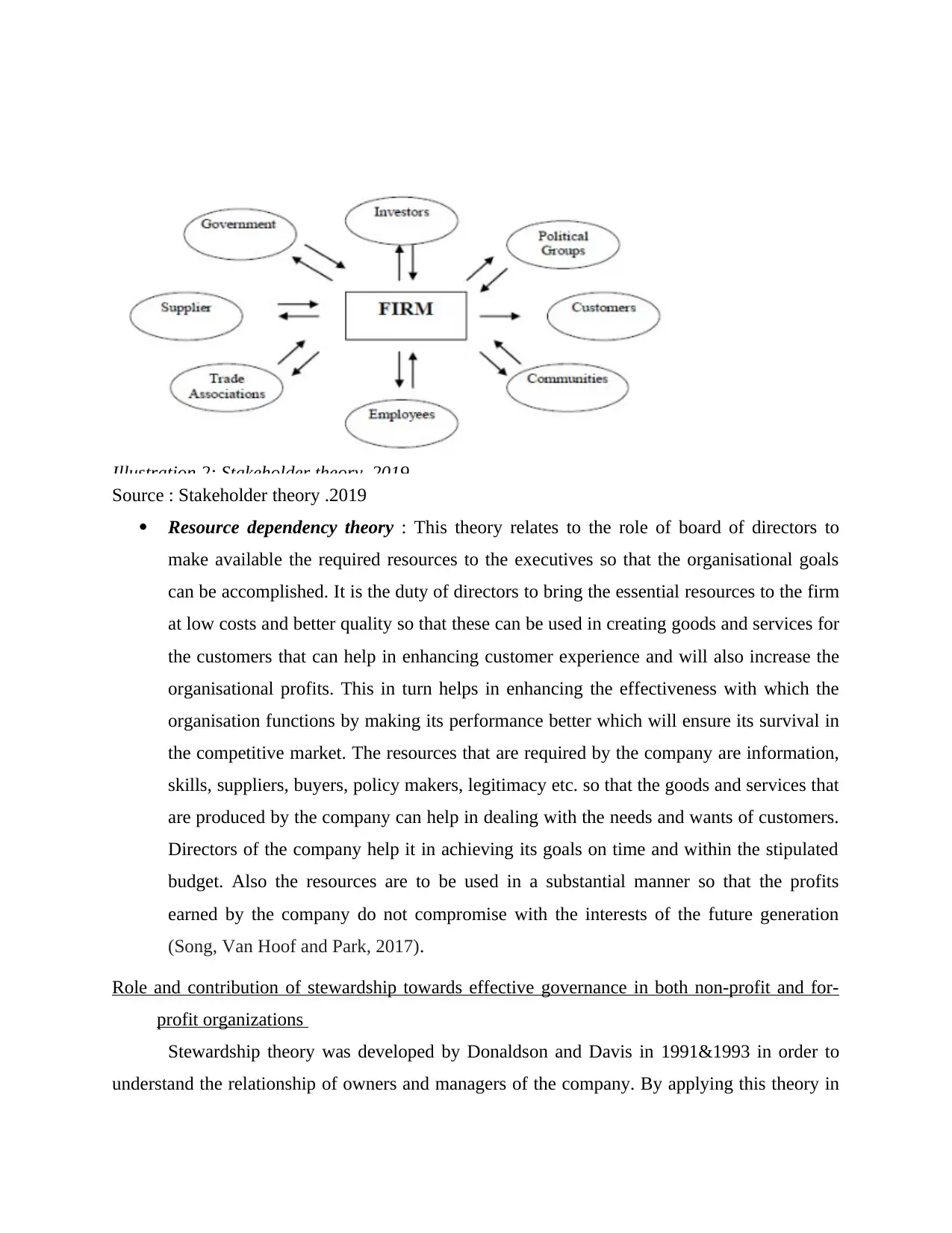
Illustration 2: Stakeholder theory .2019
Source : Stakeholder theory .2019
Resource dependency theory : This theory relates to the role of board of directors to
make available the required resources to the executives so that the organisational goals
can be accomplished. It is the duty of directors to bring the essential resources to the firm
at low costs and better quality so that these can be used in creating goods and services for
the customers that can help in enhancing customer experience and will also increase the
organisational profits. This in turn helps in enhancing the effectiveness with which the
organisation functions by making its performance better which will ensure its survival in
the competitive market. The resources that are required by the company are information,
skills, suppliers, buyers, policy makers, legitimacy etc. so that the goods and services that
are produced by the company can help in dealing with the needs and wants of customers.
Directors of the company help it in achieving its goals on time and within the stipulated
budget. Also the resources are to be used in a substantial manner so that the profits
earned by the company do not compromise with the interests of the future generation
(Song, Van Hoof and Park, 2017).
Role and contribution of stewardship towards effective governance in both non-profit and for-
profit organizations
Stewardship theory was developed by Donaldson and Davis in 1991&1993 in order to
understand the relationship of owners and managers of the company. By applying this theory in
Source : Stakeholder theory .2019
Resource dependency theory : This theory relates to the role of board of directors to
make available the required resources to the executives so that the organisational goals
can be accomplished. It is the duty of directors to bring the essential resources to the firm
at low costs and better quality so that these can be used in creating goods and services for
the customers that can help in enhancing customer experience and will also increase the
organisational profits. This in turn helps in enhancing the effectiveness with which the
organisation functions by making its performance better which will ensure its survival in
the competitive market. The resources that are required by the company are information,
skills, suppliers, buyers, policy makers, legitimacy etc. so that the goods and services that
are produced by the company can help in dealing with the needs and wants of customers.
Directors of the company help it in achieving its goals on time and within the stipulated
budget. Also the resources are to be used in a substantial manner so that the profits
earned by the company do not compromise with the interests of the future generation
(Song, Van Hoof and Park, 2017).
Role and contribution of stewardship towards effective governance in both non-profit and for-
profit organizations
Stewardship theory was developed by Donaldson and Davis in 1991&1993 in order to
understand the relationship of owners and managers of the company. By applying this theory in
Paraphrase This Document
Need a fresh take? Get an instant paraphrase of this document with our AI Paraphraser
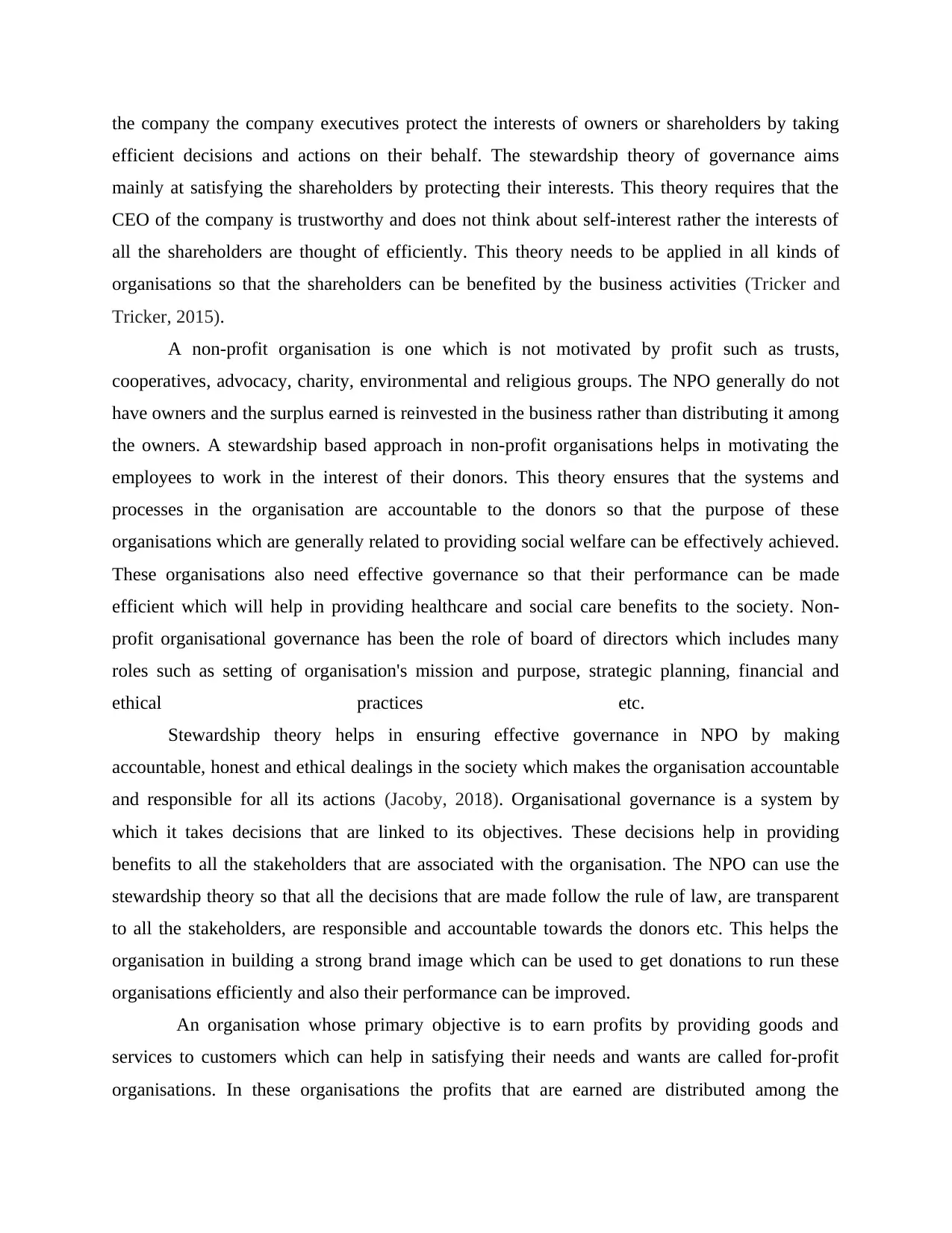
the company the company executives protect the interests of owners or shareholders by taking
efficient decisions and actions on their behalf. The stewardship theory of governance aims
mainly at satisfying the shareholders by protecting their interests. This theory requires that the
CEO of the company is trustworthy and does not think about self-interest rather the interests of
all the shareholders are thought of efficiently. This theory needs to be applied in all kinds of
organisations so that the shareholders can be benefited by the business activities (Tricker and
Tricker, 2015).
A non-profit organisation is one which is not motivated by profit such as trusts,
cooperatives, advocacy, charity, environmental and religious groups. The NPO generally do not
have owners and the surplus earned is reinvested in the business rather than distributing it among
the owners. A stewardship based approach in non-profit organisations helps in motivating the
employees to work in the interest of their donors. This theory ensures that the systems and
processes in the organisation are accountable to the donors so that the purpose of these
organisations which are generally related to providing social welfare can be effectively achieved.
These organisations also need effective governance so that their performance can be made
efficient which will help in providing healthcare and social care benefits to the society. Non-
profit organisational governance has been the role of board of directors which includes many
roles such as setting of organisation's mission and purpose, strategic planning, financial and
ethical practices etc.
Stewardship theory helps in ensuring effective governance in NPO by making
accountable, honest and ethical dealings in the society which makes the organisation accountable
and responsible for all its actions (Jacoby, 2018). Organisational governance is a system by
which it takes decisions that are linked to its objectives. These decisions help in providing
benefits to all the stakeholders that are associated with the organisation. The NPO can use the
stewardship theory so that all the decisions that are made follow the rule of law, are transparent
to all the stakeholders, are responsible and accountable towards the donors etc. This helps the
organisation in building a strong brand image which can be used to get donations to run these
organisations efficiently and also their performance can be improved.
An organisation whose primary objective is to earn profits by providing goods and
services to customers which can help in satisfying their needs and wants are called for-profit
organisations. In these organisations the profits that are earned are distributed among the
efficient decisions and actions on their behalf. The stewardship theory of governance aims
mainly at satisfying the shareholders by protecting their interests. This theory requires that the
CEO of the company is trustworthy and does not think about self-interest rather the interests of
all the shareholders are thought of efficiently. This theory needs to be applied in all kinds of
organisations so that the shareholders can be benefited by the business activities (Tricker and
Tricker, 2015).
A non-profit organisation is one which is not motivated by profit such as trusts,
cooperatives, advocacy, charity, environmental and religious groups. The NPO generally do not
have owners and the surplus earned is reinvested in the business rather than distributing it among
the owners. A stewardship based approach in non-profit organisations helps in motivating the
employees to work in the interest of their donors. This theory ensures that the systems and
processes in the organisation are accountable to the donors so that the purpose of these
organisations which are generally related to providing social welfare can be effectively achieved.
These organisations also need effective governance so that their performance can be made
efficient which will help in providing healthcare and social care benefits to the society. Non-
profit organisational governance has been the role of board of directors which includes many
roles such as setting of organisation's mission and purpose, strategic planning, financial and
ethical practices etc.
Stewardship theory helps in ensuring effective governance in NPO by making
accountable, honest and ethical dealings in the society which makes the organisation accountable
and responsible for all its actions (Jacoby, 2018). Organisational governance is a system by
which it takes decisions that are linked to its objectives. These decisions help in providing
benefits to all the stakeholders that are associated with the organisation. The NPO can use the
stewardship theory so that all the decisions that are made follow the rule of law, are transparent
to all the stakeholders, are responsible and accountable towards the donors etc. This helps the
organisation in building a strong brand image which can be used to get donations to run these
organisations efficiently and also their performance can be improved.
An organisation whose primary objective is to earn profits by providing goods and
services to customers which can help in satisfying their needs and wants are called for-profit
organisations. In these organisations the profits that are earned are distributed among the
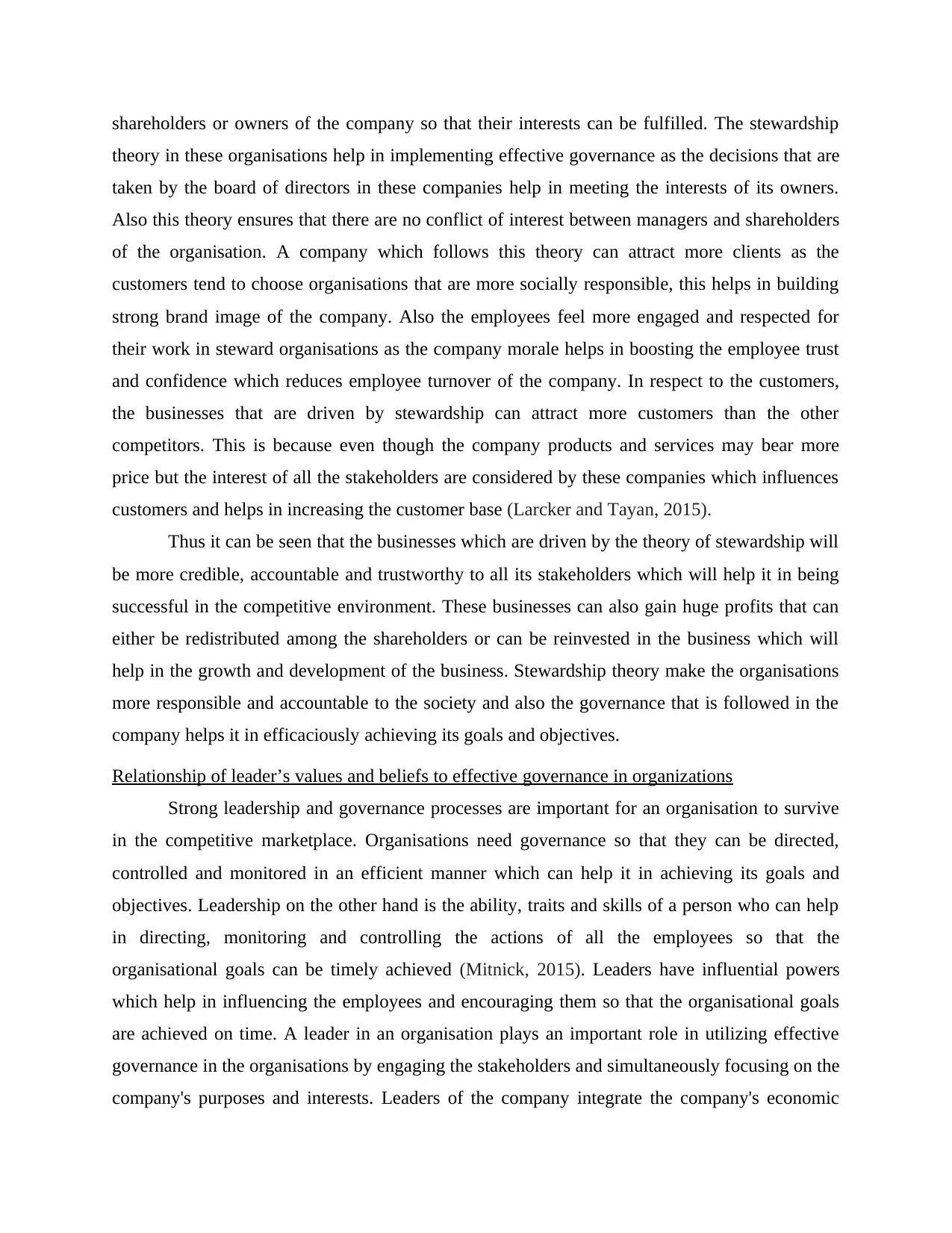
shareholders or owners of the company so that their interests can be fulfilled. The stewardship
theory in these organisations help in implementing effective governance as the decisions that are
taken by the board of directors in these companies help in meeting the interests of its owners.
Also this theory ensures that there are no conflict of interest between managers and shareholders
of the organisation. A company which follows this theory can attract more clients as the
customers tend to choose organisations that are more socially responsible, this helps in building
strong brand image of the company. Also the employees feel more engaged and respected for
their work in steward organisations as the company morale helps in boosting the employee trust
and confidence which reduces employee turnover of the company. In respect to the customers,
the businesses that are driven by stewardship can attract more customers than the other
competitors. This is because even though the company products and services may bear more
price but the interest of all the stakeholders are considered by these companies which influences
customers and helps in increasing the customer base (Larcker and Tayan, 2015).
Thus it can be seen that the businesses which are driven by the theory of stewardship will
be more credible, accountable and trustworthy to all its stakeholders which will help it in being
successful in the competitive environment. These businesses can also gain huge profits that can
either be redistributed among the shareholders or can be reinvested in the business which will
help in the growth and development of the business. Stewardship theory make the organisations
more responsible and accountable to the society and also the governance that is followed in the
company helps it in efficaciously achieving its goals and objectives.
Relationship of leader’s values and beliefs to effective governance in organizations
Strong leadership and governance processes are important for an organisation to survive
in the competitive marketplace. Organisations need governance so that they can be directed,
controlled and monitored in an efficient manner which can help it in achieving its goals and
objectives. Leadership on the other hand is the ability, traits and skills of a person who can help
in directing, monitoring and controlling the actions of all the employees so that the
organisational goals can be timely achieved (Mitnick, 2015). Leaders have influential powers
which help in influencing the employees and encouraging them so that the organisational goals
are achieved on time. A leader in an organisation plays an important role in utilizing effective
governance in the organisations by engaging the stakeholders and simultaneously focusing on the
company's purposes and interests. Leaders of the company integrate the company's economic
theory in these organisations help in implementing effective governance as the decisions that are
taken by the board of directors in these companies help in meeting the interests of its owners.
Also this theory ensures that there are no conflict of interest between managers and shareholders
of the organisation. A company which follows this theory can attract more clients as the
customers tend to choose organisations that are more socially responsible, this helps in building
strong brand image of the company. Also the employees feel more engaged and respected for
their work in steward organisations as the company morale helps in boosting the employee trust
and confidence which reduces employee turnover of the company. In respect to the customers,
the businesses that are driven by stewardship can attract more customers than the other
competitors. This is because even though the company products and services may bear more
price but the interest of all the stakeholders are considered by these companies which influences
customers and helps in increasing the customer base (Larcker and Tayan, 2015).
Thus it can be seen that the businesses which are driven by the theory of stewardship will
be more credible, accountable and trustworthy to all its stakeholders which will help it in being
successful in the competitive environment. These businesses can also gain huge profits that can
either be redistributed among the shareholders or can be reinvested in the business which will
help in the growth and development of the business. Stewardship theory make the organisations
more responsible and accountable to the society and also the governance that is followed in the
company helps it in efficaciously achieving its goals and objectives.
Relationship of leader’s values and beliefs to effective governance in organizations
Strong leadership and governance processes are important for an organisation to survive
in the competitive marketplace. Organisations need governance so that they can be directed,
controlled and monitored in an efficient manner which can help it in achieving its goals and
objectives. Leadership on the other hand is the ability, traits and skills of a person who can help
in directing, monitoring and controlling the actions of all the employees so that the
organisational goals can be timely achieved (Mitnick, 2015). Leaders have influential powers
which help in influencing the employees and encouraging them so that the organisational goals
are achieved on time. A leader in an organisation plays an important role in utilizing effective
governance in the organisations by engaging the stakeholders and simultaneously focusing on the
company's purposes and interests. Leaders of the company integrate the company's economic
⊘ This is a preview!⊘
Do you want full access?
Subscribe today to unlock all pages.

Trusted by 1+ million students worldwide
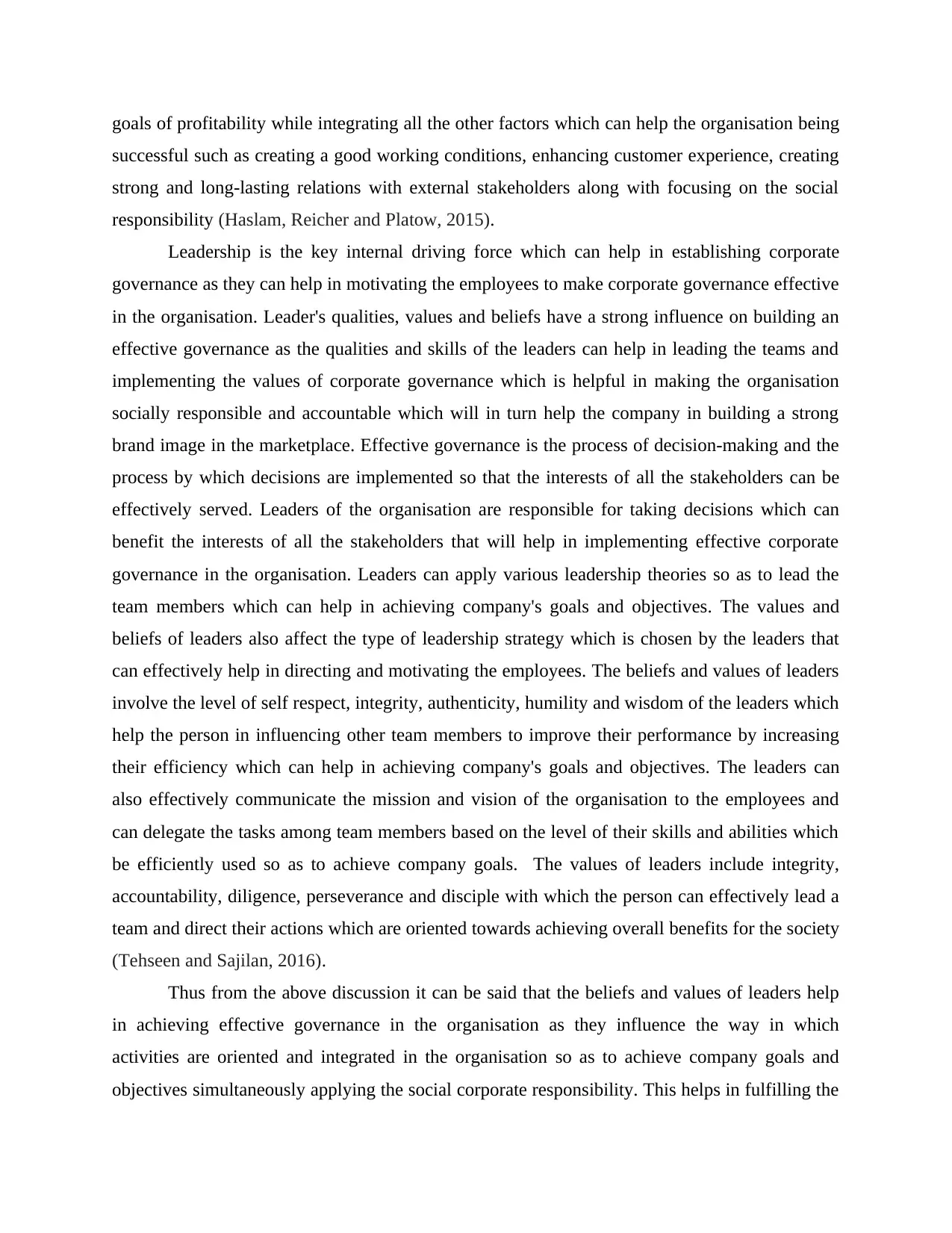
goals of profitability while integrating all the other factors which can help the organisation being
successful such as creating a good working conditions, enhancing customer experience, creating
strong and long-lasting relations with external stakeholders along with focusing on the social
responsibility (Haslam, Reicher and Platow, 2015).
Leadership is the key internal driving force which can help in establishing corporate
governance as they can help in motivating the employees to make corporate governance effective
in the organisation. Leader's qualities, values and beliefs have a strong influence on building an
effective governance as the qualities and skills of the leaders can help in leading the teams and
implementing the values of corporate governance which is helpful in making the organisation
socially responsible and accountable which will in turn help the company in building a strong
brand image in the marketplace. Effective governance is the process of decision-making and the
process by which decisions are implemented so that the interests of all the stakeholders can be
effectively served. Leaders of the organisation are responsible for taking decisions which can
benefit the interests of all the stakeholders that will help in implementing effective corporate
governance in the organisation. Leaders can apply various leadership theories so as to lead the
team members which can help in achieving company's goals and objectives. The values and
beliefs of leaders also affect the type of leadership strategy which is chosen by the leaders that
can effectively help in directing and motivating the employees. The beliefs and values of leaders
involve the level of self respect, integrity, authenticity, humility and wisdom of the leaders which
help the person in influencing other team members to improve their performance by increasing
their efficiency which can help in achieving company's goals and objectives. The leaders can
also effectively communicate the mission and vision of the organisation to the employees and
can delegate the tasks among team members based on the level of their skills and abilities which
be efficiently used so as to achieve company goals. The values of leaders include integrity,
accountability, diligence, perseverance and disciple with which the person can effectively lead a
team and direct their actions which are oriented towards achieving overall benefits for the society
(Tehseen and Sajilan, 2016).
Thus from the above discussion it can be said that the beliefs and values of leaders help
in achieving effective governance in the organisation as they influence the way in which
activities are oriented and integrated in the organisation so as to achieve company goals and
objectives simultaneously applying the social corporate responsibility. This helps in fulfilling the
successful such as creating a good working conditions, enhancing customer experience, creating
strong and long-lasting relations with external stakeholders along with focusing on the social
responsibility (Haslam, Reicher and Platow, 2015).
Leadership is the key internal driving force which can help in establishing corporate
governance as they can help in motivating the employees to make corporate governance effective
in the organisation. Leader's qualities, values and beliefs have a strong influence on building an
effective governance as the qualities and skills of the leaders can help in leading the teams and
implementing the values of corporate governance which is helpful in making the organisation
socially responsible and accountable which will in turn help the company in building a strong
brand image in the marketplace. Effective governance is the process of decision-making and the
process by which decisions are implemented so that the interests of all the stakeholders can be
effectively served. Leaders of the organisation are responsible for taking decisions which can
benefit the interests of all the stakeholders that will help in implementing effective corporate
governance in the organisation. Leaders can apply various leadership theories so as to lead the
team members which can help in achieving company's goals and objectives. The values and
beliefs of leaders also affect the type of leadership strategy which is chosen by the leaders that
can effectively help in directing and motivating the employees. The beliefs and values of leaders
involve the level of self respect, integrity, authenticity, humility and wisdom of the leaders which
help the person in influencing other team members to improve their performance by increasing
their efficiency which can help in achieving company's goals and objectives. The leaders can
also effectively communicate the mission and vision of the organisation to the employees and
can delegate the tasks among team members based on the level of their skills and abilities which
be efficiently used so as to achieve company goals. The values of leaders include integrity,
accountability, diligence, perseverance and disciple with which the person can effectively lead a
team and direct their actions which are oriented towards achieving overall benefits for the society
(Tehseen and Sajilan, 2016).
Thus from the above discussion it can be said that the beliefs and values of leaders help
in achieving effective governance in the organisation as they influence the way in which
activities are oriented and integrated in the organisation so as to achieve company goals and
objectives simultaneously applying the social corporate responsibility. This helps in fulfilling the
Paraphrase This Document
Need a fresh take? Get an instant paraphrase of this document with our AI Paraphraser
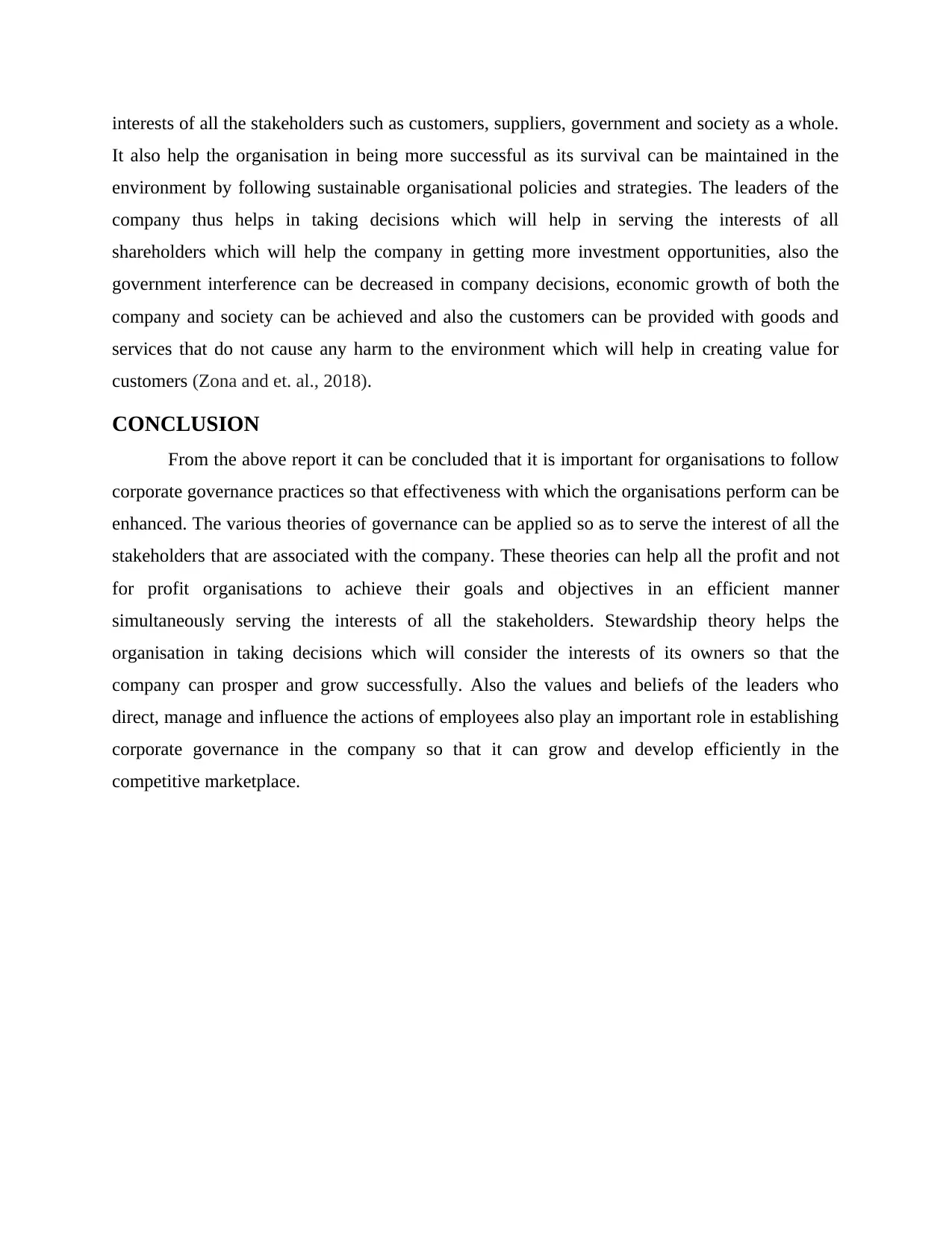
interests of all the stakeholders such as customers, suppliers, government and society as a whole.
It also help the organisation in being more successful as its survival can be maintained in the
environment by following sustainable organisational policies and strategies. The leaders of the
company thus helps in taking decisions which will help in serving the interests of all
shareholders which will help the company in getting more investment opportunities, also the
government interference can be decreased in company decisions, economic growth of both the
company and society can be achieved and also the customers can be provided with goods and
services that do not cause any harm to the environment which will help in creating value for
customers (Zona and et. al., 2018).
CONCLUSION
From the above report it can be concluded that it is important for organisations to follow
corporate governance practices so that effectiveness with which the organisations perform can be
enhanced. The various theories of governance can be applied so as to serve the interest of all the
stakeholders that are associated with the company. These theories can help all the profit and not
for profit organisations to achieve their goals and objectives in an efficient manner
simultaneously serving the interests of all the stakeholders. Stewardship theory helps the
organisation in taking decisions which will consider the interests of its owners so that the
company can prosper and grow successfully. Also the values and beliefs of the leaders who
direct, manage and influence the actions of employees also play an important role in establishing
corporate governance in the company so that it can grow and develop efficiently in the
competitive marketplace.
It also help the organisation in being more successful as its survival can be maintained in the
environment by following sustainable organisational policies and strategies. The leaders of the
company thus helps in taking decisions which will help in serving the interests of all
shareholders which will help the company in getting more investment opportunities, also the
government interference can be decreased in company decisions, economic growth of both the
company and society can be achieved and also the customers can be provided with goods and
services that do not cause any harm to the environment which will help in creating value for
customers (Zona and et. al., 2018).
CONCLUSION
From the above report it can be concluded that it is important for organisations to follow
corporate governance practices so that effectiveness with which the organisations perform can be
enhanced. The various theories of governance can be applied so as to serve the interest of all the
stakeholders that are associated with the company. These theories can help all the profit and not
for profit organisations to achieve their goals and objectives in an efficient manner
simultaneously serving the interests of all the stakeholders. Stewardship theory helps the
organisation in taking decisions which will consider the interests of its owners so that the
company can prosper and grow successfully. Also the values and beliefs of the leaders who
direct, manage and influence the actions of employees also play an important role in establishing
corporate governance in the company so that it can grow and develop efficiently in the
competitive marketplace.
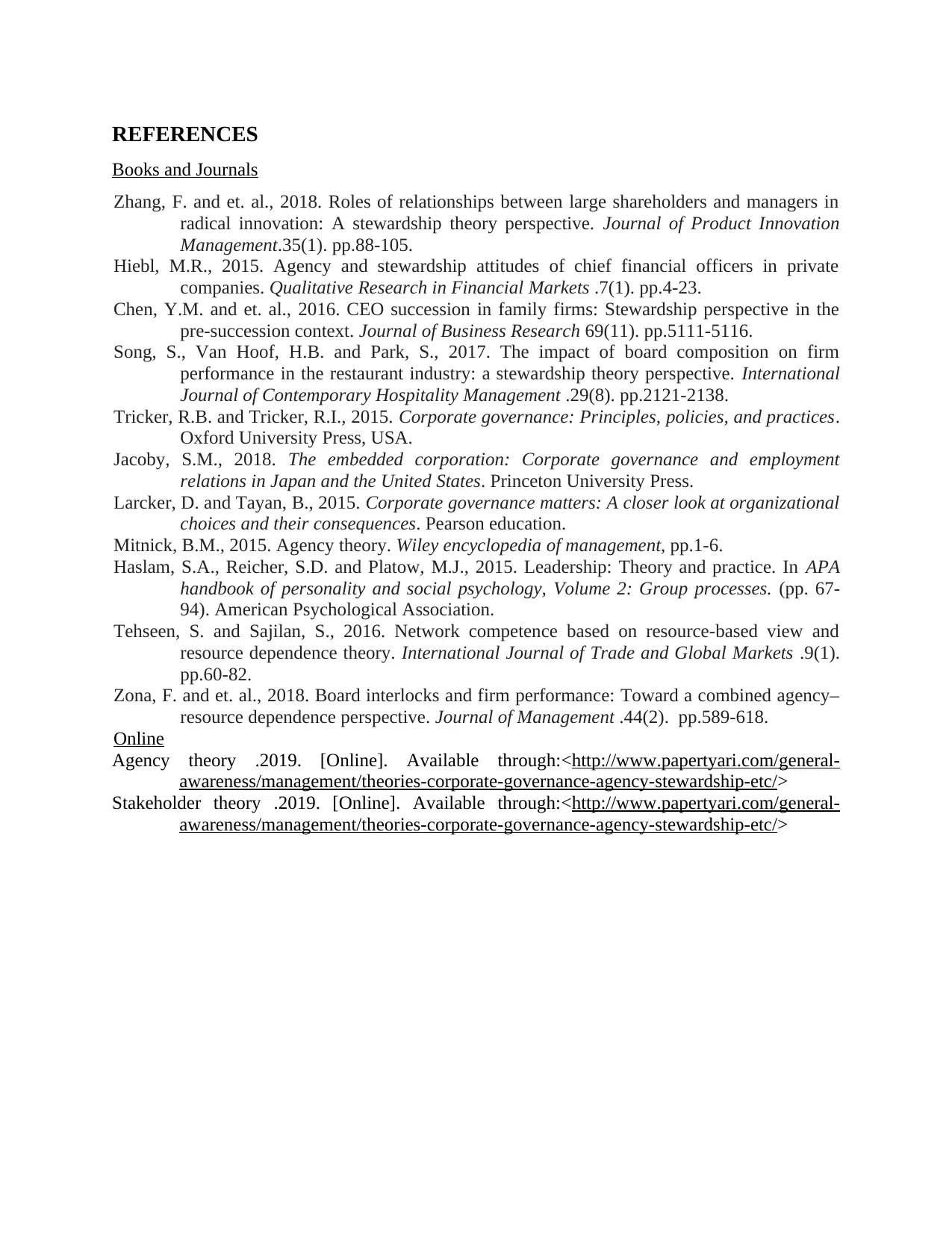
REFERENCES
Books and Journals
Zhang, F. and et. al., 2018. Roles of relationships between large shareholders and managers in
radical innovation: A stewardship theory perspective. Journal of Product Innovation
Management.35(1). pp.88-105.
Hiebl, M.R., 2015. Agency and stewardship attitudes of chief financial officers in private
companies. Qualitative Research in Financial Markets .7(1). pp.4-23.
Chen, Y.M. and et. al., 2016. CEO succession in family firms: Stewardship perspective in the
pre-succession context. Journal of Business Research 69(11). pp.5111-5116.
Song, S., Van Hoof, H.B. and Park, S., 2017. The impact of board composition on firm
performance in the restaurant industry: a stewardship theory perspective. International
Journal of Contemporary Hospitality Management .29(8). pp.2121-2138.
Tricker, R.B. and Tricker, R.I., 2015. Corporate governance: Principles, policies, and practices.
Oxford University Press, USA.
Jacoby, S.M., 2018. The embedded corporation: Corporate governance and employment
relations in Japan and the United States. Princeton University Press.
Larcker, D. and Tayan, B., 2015. Corporate governance matters: A closer look at organizational
choices and their consequences. Pearson education.
Mitnick, B.M., 2015. Agency theory. Wiley encyclopedia of management, pp.1-6.
Haslam, S.A., Reicher, S.D. and Platow, M.J., 2015. Leadership: Theory and practice. In APA
handbook of personality and social psychology, Volume 2: Group processes. (pp. 67-
94). American Psychological Association.
Tehseen, S. and Sajilan, S., 2016. Network competence based on resource-based view and
resource dependence theory. International Journal of Trade and Global Markets .9(1).
pp.60-82.
Zona, F. and et. al., 2018. Board interlocks and firm performance: Toward a combined agency–
resource dependence perspective. Journal of Management .44(2). pp.589-618.
Online
Agency theory .2019. [Online]. Available through:<http://www.papertyari.com/general-
awareness/management/theories-corporate-governance-agency-stewardship-etc/>
Stakeholder theory .2019. [Online]. Available through:<http://www.papertyari.com/general-
awareness/management/theories-corporate-governance-agency-stewardship-etc/>
Books and Journals
Zhang, F. and et. al., 2018. Roles of relationships between large shareholders and managers in
radical innovation: A stewardship theory perspective. Journal of Product Innovation
Management.35(1). pp.88-105.
Hiebl, M.R., 2015. Agency and stewardship attitudes of chief financial officers in private
companies. Qualitative Research in Financial Markets .7(1). pp.4-23.
Chen, Y.M. and et. al., 2016. CEO succession in family firms: Stewardship perspective in the
pre-succession context. Journal of Business Research 69(11). pp.5111-5116.
Song, S., Van Hoof, H.B. and Park, S., 2017. The impact of board composition on firm
performance in the restaurant industry: a stewardship theory perspective. International
Journal of Contemporary Hospitality Management .29(8). pp.2121-2138.
Tricker, R.B. and Tricker, R.I., 2015. Corporate governance: Principles, policies, and practices.
Oxford University Press, USA.
Jacoby, S.M., 2018. The embedded corporation: Corporate governance and employment
relations in Japan and the United States. Princeton University Press.
Larcker, D. and Tayan, B., 2015. Corporate governance matters: A closer look at organizational
choices and their consequences. Pearson education.
Mitnick, B.M., 2015. Agency theory. Wiley encyclopedia of management, pp.1-6.
Haslam, S.A., Reicher, S.D. and Platow, M.J., 2015. Leadership: Theory and practice. In APA
handbook of personality and social psychology, Volume 2: Group processes. (pp. 67-
94). American Psychological Association.
Tehseen, S. and Sajilan, S., 2016. Network competence based on resource-based view and
resource dependence theory. International Journal of Trade and Global Markets .9(1).
pp.60-82.
Zona, F. and et. al., 2018. Board interlocks and firm performance: Toward a combined agency–
resource dependence perspective. Journal of Management .44(2). pp.589-618.
Online
Agency theory .2019. [Online]. Available through:<http://www.papertyari.com/general-
awareness/management/theories-corporate-governance-agency-stewardship-etc/>
Stakeholder theory .2019. [Online]. Available through:<http://www.papertyari.com/general-
awareness/management/theories-corporate-governance-agency-stewardship-etc/>
⊘ This is a preview!⊘
Do you want full access?
Subscribe today to unlock all pages.

Trusted by 1+ million students worldwide
1 out of 9
Related Documents
Your All-in-One AI-Powered Toolkit for Academic Success.
+13062052269
info@desklib.com
Available 24*7 on WhatsApp / Email
![[object Object]](/_next/static/media/star-bottom.7253800d.svg)
Unlock your academic potential
Copyright © 2020–2026 A2Z Services. All Rights Reserved. Developed and managed by ZUCOL.





